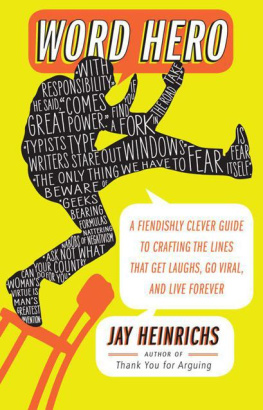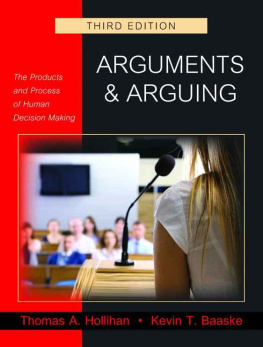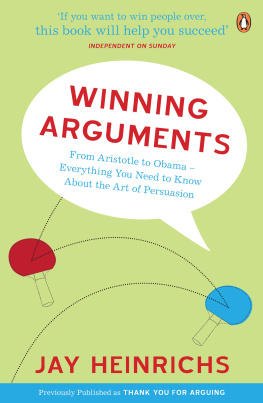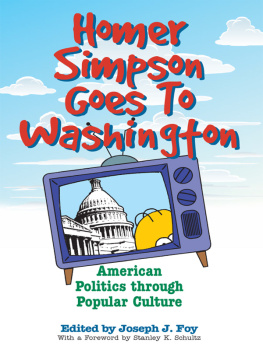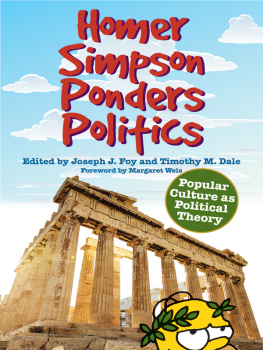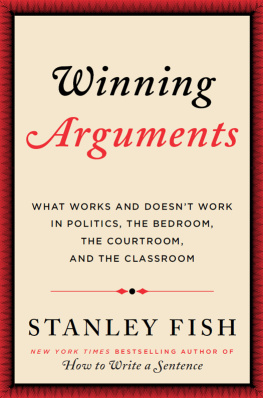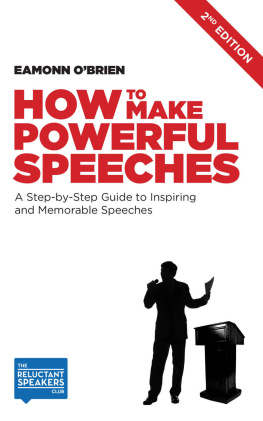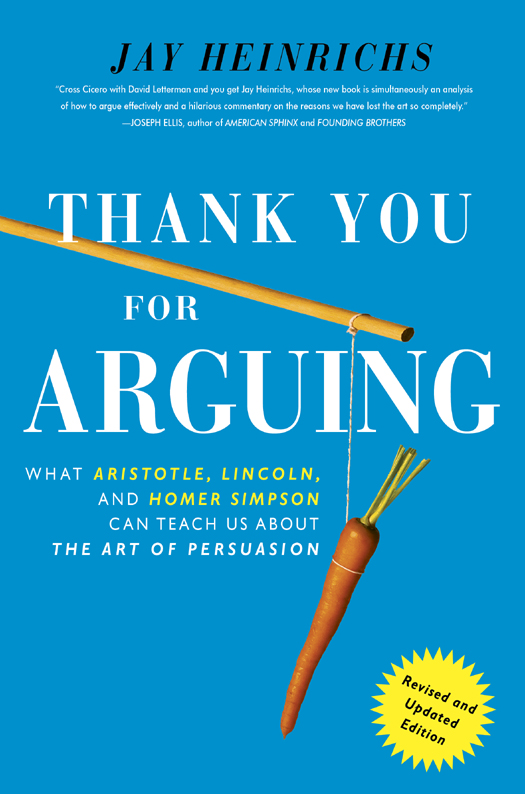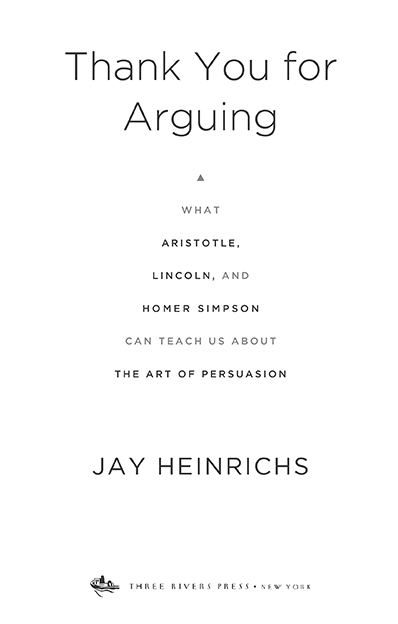Copyright 2007, 2013 by Jay Heinrichs
All rights reserved.
Published in the United States by Three Rivers Press, an imprint of the Crown Publishing Group, a division of Random House, Inc., New York.
www.crownpublishing.com
Three Rivers Press and the Tugboat design are registered trademarks of Random House, Inc.
Originally published in paperback in slightly different form in the United States by Three Rivers Press, an imprint of the Crown Publishing Group, a division of Random House, Inc., New York, in 2007.
Library of Congress Cataloging-in-Publication data is available upon request.
eISBN: 978-0-385-34778-5
Cover design by Gabriel Levine
v3.1
More Praise for
THANK YOU FOR ARGUING
Heinrichs is a clever, passionate and erudite advocate for rhetoric, the 3,000-year-old art of persuasion, and his user-friendly primer brims with anecdotes, historical and popular-culture references, sidebars, tips and definitions.
Publishers Weekly
A lot of people think of rhetoric as a dirty word, but a long time agothink ancient Greeceit was perhaps the noblest of arts. Jay Heinrichss book is a timely, valuable, and entertaining contribution to its much-needed rehabilitation.
Ben Yagoda, author of About Town: The New Yorker and the World It Made and
The Sound on the Page: Great Writers Talk About Style and Voice in Writing
Knowing how to use the proper words is an art; knowing how to intersperse them with savvy pauses is a mystery. Words are treacherous: they either explain or conceal. And silence is all the more dangerous: speak too much and youve become redundant; speak too little and youre ignored. But speak in just the right way and then be quiet and youll be revered and esteemed. Jay Heinrichss superb modern manual on rhetoric shows the extent to which we are what we sayand how. Ah, the mysteries of the tongue!
Ilan Stavans, author of Dictionary Days: A Defining Passion
A rhetorical cocktail party where the guest list includes Cicero, Britney Spears, St. Augustine, and Queen Victoria. From MTV to Aristotle, Heinrichs entertains, enlightens, and even teaches us a little Greek, persuading us that the big battles and daily combats of work, love, and life can be won. If argument is the cradle of thought, Thank You for Arguingcan make us all better thinkers. So listen up!
Sarah McGinty, author of Power Talk:
Using Language to Build Authority and Influence
Reading Thank You for Arguing is like having a lively talk with the author about the very backbone of real talk, the willingness of people to change each othersand their ownideas through constructive argument. Writing with vividness and rigor, Jay Heinrichs maps this territory so youll always know where you are. Youll scratch your head, grit your teeth, smack your forehead, and laugh out loud as he guides you through the landscape of differing with a difference.
Margaret Shepherd, author of The Art of Civilized Conversation: A Guide to
Expressing Yourself with Grace and Style
Who knew that a rhetorician could be a seducer, a swashbuckler, and a stand-up comic? In this inspiring and original study, Jay Heinrichs illuminates the ways in which we understand, enjoy, and infuriate each other, all the while instructing us on ways to make certain everyone will be on our side. Heinrichss prose is not only engaging, its hysterically funny. Aristotle would have loved him; so too John Adams, Daniel Webster, and Abraham Lincoln; E. B. White would have become his agent. Rhetoric doesnt get any better than this.
Regina Barreca, editor of The Signet Book of American Humor
To Dorothy Jr. and George:
You win.

CONTENTS

PREFACE
Few people can say that John Quincy Adams changed their lives. Those who can are wise to keep it to themselves. Friends tell me I should also avoid writing about my passion for rhetoric, the three-thousand-year-old art of persuasion.
John Quincy Adams changed my life by introducing me to rhetoric.
Sorry.
Years ago, I was wandering through Dartmouth Colleges library for no particular reason, flipping through books at random, and in a dim corner of the stacks I found a large section on rhetoric, the art of persuasion. A dusty, maroon-red volume attributed to Adams sat at eye level. I flipped it open and felt like an indoor Coronado. Here lay treasure.
The volume contained a set of rhetorical lectures that Adams taught to undergraduates at Harvard College from 1805 to 1809, when he was a United States senator commuting between Massachusetts and Washington. In his first class, the paunchy, balding thirty-eight-year-old urged his goggling adolescents to catch from the relics of ancient oratory those unresisted powers, which mould the mind of man to the will of the speaker, and yield the guidance of the nation to the dominion of the voice. To me that sounded more like hypnosis than politics, which was sort of cool in a Manchurian Candidate way.
In the years since, while reading all I could of rhetoric, I came to realize something: Adamss language sounded antique, but the powers he described are real. Rhetoric means more than grand oratory, more than using words to influence or persuade, as Websters defines it. It teaches us to argue without anger. And it offers a chance to tap into a source of social power I never knew existed.
You could say that rhetoric talked me into itself.

FOREWORD TO THE NEW EDITION
After it seduced me, rhetoric bore fruit and multiplied. Six years after the first publication of this book, AP English classes regularly use Thank You for Arguing, the book has been translated into six languages and become a beautifully voiced audiobook, and I get letters from parents whose kids are getting all rhetorical after reading about my wiseacre offspring.
While argument itself seems a fresher subject than ever, some of the original editions examples in culture and politics have grown gray hairs. George W. Bush, a rhetorical master of the strategic malapropism, no longer occupies the White House. Cultural icons and national disasters have been replaced by newer icons (Adele) and national disasters (the Kardashians). Meanwhile, an obscure state senator named Barack Obama stunned us with his rhetorical acumen and took up residence in the White House. So, for this edition, I freshened things up with new examples from politics and the media.
But this new edition is far more than a mere update. Thoughtful readers and rhetoricians have been sending me comments and corrections for several years, and many of them are reflected in this version. In addition, my persuasion consulting work and the dozens of lectures Ive given have let me explore new aspects of rhetoric far beyond my writing cabin in New Hampshire. I have put in substantial new material on identity rhetoric, persuasion tied to peoples sense of their best selves. Youll find a new chapter on a device I call a halo, an identity tool that attaches to your audiences deepest values. My corporate persuasion work inspired a new chapter on how to screw upa skill that applies to your personal as well as work life. And because President Obama is a one-man master class in oratory, Ive also added a chapter that provides some examples of his speechmaking skills in action.



